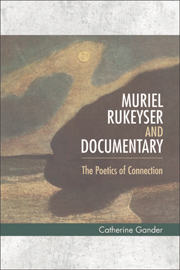1 - Introduction
Published online by Cambridge University Press: 05 August 2013
Summary
Muriel Rukeyser – poet, biographer, novelist and playwright – remains surprisingly neglected by scholars of American literature and culture. Although a handful of scholars (whose important scholarship will be referred to in the course of this book) are helping to initiate a recovery of her work, Rukeyser is too often omitted from academic reading lists, library bookshelves and poetry anthologies. My reason for writing this book was principally to address this lack and to help instigate a proper reclamation of Rukeyser's writing, situating her firmly in the canon of essential twentieth-century American poets and acknowledging her role as a critical cultural figure of her age.
Hailed by the poet and critical essayist Kenneth Rexroth as ‘by far the best poet of her exact generation’, Rukeyser (1913–80) was born in New York City to Jewish parents, Lawrence and Myra Lyons Rukeyser. She lived and worked in America for the duration of her life, either in New York or California, and began writing in earnest in the 1930s, publishing her first book of poetry, Theory of Flight, in 1935. Throughout her life, Rukeyser wrote with the conviction that there are
two kinds of poems: the poems of unverifiable facts, based in dreams, in sex, in everything that can be given to other people only through the skill and strength by which it is given; and the other kind being the document, the poem that rests on material evidence.
- Type
- Chapter
- Information
- Muriel Rukeyser and DocumentaryThe Poetics of Connection, pp. 1 - 22Publisher: Edinburgh University PressPrint publication year: 2013

